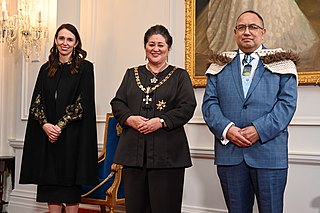
The Right Honourable is an honorific style traditionally applied to certain persons and collective bodies in the United Kingdom,the former British Empire and the Commonwealth of Nations. The term is predominantly used today as a style associated with the holding of certain senior public offices in the United Kingdom,Canada,New Zealand,and,to a lesser extent,Australia.
James Brian Edward Hutton,Baron Hutton,PC was a British Lord Chief Justice of Northern Ireland and Lord of Appeal in Ordinary.

The Order of precedence in New Zealand is a guide to the relative seniority of constitutional office holders and certain others,to be followed,as appropriate at State and official functions. The previous order of precedence was revoked and Queen Elizabeth II approved the following Order of Precedence in New Zealand effective 20 September 2018:
- The Monarch of New Zealand.
- The Governor-General or,while acting in the place of the Governor-General,the officer administering the Government
- The Prime Minister
- The Speaker of the House of Representatives
- The Chief Justice
- The Dean of the Diplomatic Corps
- The Deputy Prime Minister
- Ministers of the Crown
- Former Governors-General
- Ambassadors and High Commissioners in New Zealand and Chargés d’Affaires accredited to New Zealand.
- The Leader of the Opposition in the House of Representatives
- Leaders,including co-leaders and joint leaders,of political parties represented in the House of Representatives,other than Ministers of the Crown.
- Members of the House of Representatives. There is no established order of precedence over members of parliament in general,although each party has its internal ranking.
- Judges of the Supreme Court of New Zealand,the Court of Appeal and the High Court of New Zealand.
- Former Prime Ministers,former Speakers of the House of Representatives,former Chief Justices,and members of the Privy Council.
- Mayors of territorial authorities and chairpersons of regional councils,while in their own cities,districts and regions. In 1989,boroughs and counties were amalgamated into district councils. District mayors,and the Chatham Islands mayor could expect to be accorded this same precedence.
- The Public Service Commissioner,Chief of Defence Force,Commissioner of Police,and Officers of Parliament .
- The Solicitor-General,Clerk of the House of Representatives,and Clerk of the Executive Council when attending a function involving the exercise of the position’s specific responsibilities.
- Chief executives of public service and non-public service departments.
- The Vice Chief of Defence Force,and Chiefs of Navy,Army and Air Force,and other statutory office holders.
- Consuls-General and Consuls of countries without diplomatic representation in New Zealand.
- Members of New Zealand and British orders,and holders of decorations and medals in accordance with the Order of Wear in New Zealand.

The Court of Appeal of New Zealand is the principal intermediate appellate court of New Zealand. It is also the final appellate court for a number of matters. In practice,most appeals are resolved at this intermediate appellate level,rather than in the Supreme Court. The Court of Appeal has existed as a separate court since 1862 but,until 1957,it was composed of judges of the High Court sitting periodically in panels. In 1957 the Court of Appeal was reconstituted as a permanent court separate from the High Court. It is located in Wellington.
Sir Vincent Frederick Floissac was a Saint Lucian jurist and politician. He was styled The Rt. Hon. Sir Vincent Floissac by virtue of his membership of the Privy Council of the United Kingdom.

The judiciary of Gibraltar is a branch of the Government of Gibraltar that interprets and applies the law of Gibraltar,to ensure equal justice under law,and to provide a mechanism for dispute resolution. The legal system of Gibraltar is based on English law and is a mix of common law and statute. The hierarchical system of courts includes a magistrates' court,a supreme court and a non-resident appellate court.

The chief justice of the Supreme Court of Gibraltar is one of the four judges who make up the supreme court of Gibraltar. Previously the chief justice was appointed by the Governor of Gibraltar on the advice of the British Foreign and Commonwealth Office. Under the 2006 Constitution the Governor,on the advice of the Judicial Service Commission,makes the appointment on behalf of the Monarch.

The Judges' Council is a body in England and Wales that,representing the judiciary,advises the Lord Chief Justice on judicial matters. It has its historical roots in the original Council of the Judges of the Supreme Court,created by the Judicature Act 1873 to oversee the new Supreme Court of Judicature. This body initially met regularly,reforming the procedure used by the circuit courts,and the new High Court of Justice but met less regularly as time went on,meeting only twice between 1900 and 1907,with a gap of ten years between meetings in 1940 and 1950 respectively. After relative inactivity,it was eventually wound up through the Supreme Court Act 1981,which contained no provisions for its continued existence,something Denis Dobson attributes to newer bodies which performed the duties the Council had originally been created to do.
The chief justice of the Bahamas heads the Supreme Court of the Bahamas.

Sir Timothy Victor Holroyde,PC,styled The Rt. Hon. Lord Justice Holroyde,is an English Court of Appeal judge,formerly a judge of the High Court of Justice of England and Wales,Queen's Bench Division. He was appointed to the Court of Appeal in October 2017. He was sworn of the Privy Council in 2017. In 2015 he was appointed a member of the Sentencing Council for England and Wales,and served as its Chairman between 2018 and 2022. In June 2022 he was appointed Vice-President of the Court of Appeal,succeeding Lord Justice Fulford.

The High Court of Tuvalu is the superior court of Tuvalu. It has unlimited original jurisdiction to determine the Law of Tuvalu and hears appeals from the lower courts.

Sir Launcelot Dinadan James Henderson,styled The Rt Hon. Lord Justice Henderson or Sir Launcelot Henderson,is a retired Lord Justice of Appeal.
Sir David Michael Bean is a British judge of the Court of Appeal of England and Wales.

Sir Mark David John Warby PC,styled The Rt Hon. Lord Justice Warby,is a Lord Justice of Appeal.

Sir Christopher George Nugee,officially styled the Rt Hon. Lord Justice Nugee,is a British lawyer who has served as a Lord Justice of Appeal of England and Wales since 2020.
The Honourable or The Honorable is an honorific style that is used as a prefix before the names or titles of certain people,usually with official governmental or diplomatic positions.
As part of the British honours system,Special Honours are issued at the Monarch's pleasure at any given time. The Special Honours refer to the awards made within royal prerogative,operational honours and other honours awarded outside the New Years Honours and Birthday Honours.












